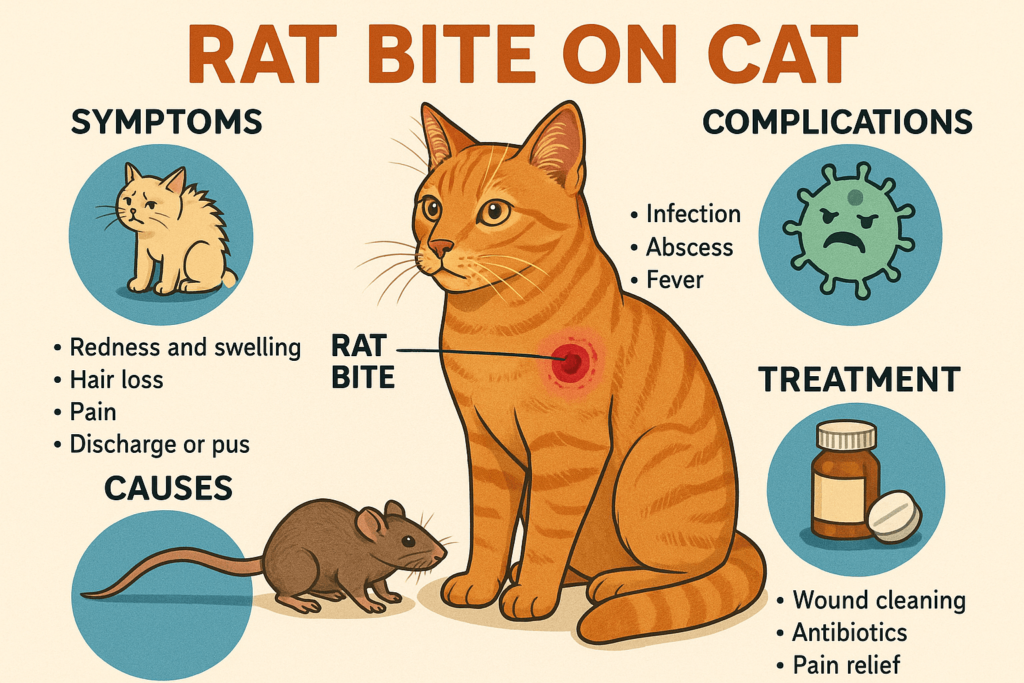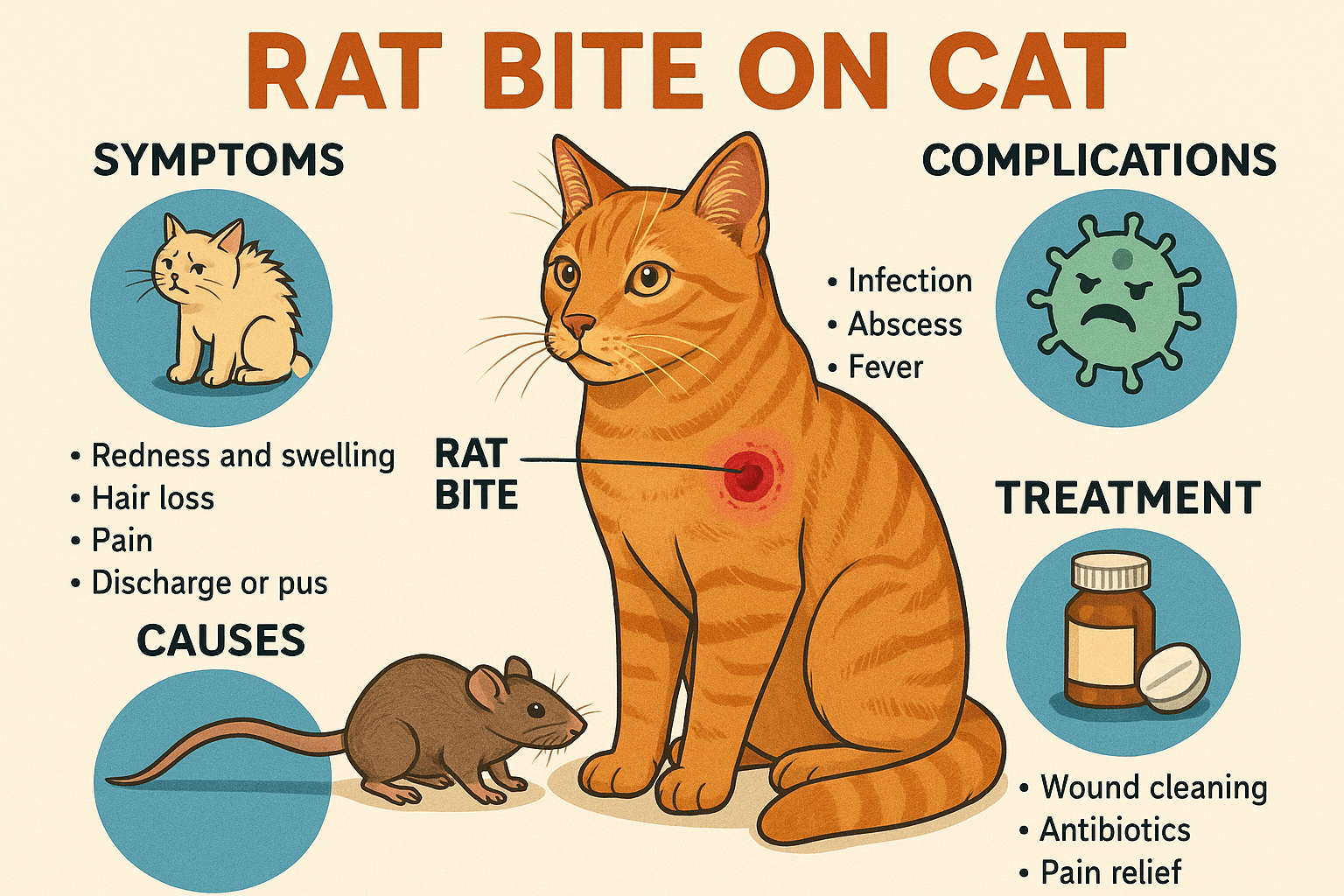What to Do If Your Cat Suffers a Rat Bite
Rat bites on cats may seem uncommon, but they can happen, especially if your feline friend spends time outdoors or encounters rodents. While cats are natural hunters and often have the upper hand in confrontations with rats, a rat bite can still pose serious health risks. These bites can transmit infections, cause wounds that need medical attention, and even lead to complications if left untreated. Understanding how to respond quickly and effectively is crucial for ensuring your cat’s well-being. This blog post will guide you through recognizing, treating, and preventing rat bites on cats, empowering you to act confidently if such an incident occurs.
Signs and Symptoms of a Rat Bite on Your Cat
If you suspect your cat has been bitten by a rat, it’s important to look for specific signs and symptoms. Early detection can make a significant difference in treatment outcomes.
Visible Wounds or Bleeding:
Check your cat’s body for puncture marks, scratches, or areas of broken skin that may indicate a bite.Swelling or Redness Around the Bite Area:
Inflammation is a common reaction to a rat bite and may signal an infection developing at the site.Lethargy or Unusual Behavior:
A bitten cat may appear unusually tired, withdrawn, or less interested in activities they normally enjoy.Loss of Appetite:
Cats suffering from pain or illness due to a rat bite may refuse food or show disinterest in eating.Fever or Elevated Temperature:
A fever can be a sign that your cat’s body is fighting off an infection caused by the bite.
Recognizing these symptoms early allows you to seek veterinary care promptly, reducing the risk of complications.

Immediate Steps to Take After a Rat Bite
When your cat suffers a rat bite, acting quickly is essential to minimize harm and prevent infection. Follow these steps to provide immediate care before consulting a veterinarian.
Clean the Wound Thoroughly:
Use warm water and mild soap to gently clean the bite area. Avoid using harsh chemicals that could irritate the wound further.Apply an Antiseptic Solution:
After cleaning, apply a pet-safe antiseptic to reduce the risk of bacterial infection.Control Bleeding if Necessary:
Apply gentle pressure with a clean cloth or gauze to stop any bleeding. Avoid wrapping the area too tightly.Keep Your Cat Calm and Restrained:
Prevent your cat from licking or biting the wound, as this can introduce bacteria and worsen the injury.Monitor for Signs of Infection:
Watch for worsening redness, swelling, pus, or other signs of infection, which require immediate veterinary attention.
Taking these steps promptly can help stabilize your cat’s condition until professional care is available.
Check this guide 👉Understanding Cat Tail Bite Wounds: Best 7 Expert Tips!
Check this guide 👉Cat Bite vs Dog Bite: Best 7 Expert Tips!
Check this guide 👉What to Do If Your Cat Gets a Fox Bite: Best 7 Expert Tips!
Preventing Rat Bites on Cats | Potential Risks of Rat Bites |
|---|---|
Keep cats indoors during peak rodent hours | Risk of bacterial infections like pasteurella |
Eliminate food sources that attract rodents | Transmission of diseases such as leptospirosis |
Use humane traps to control rodent populations | Potential for rabies transmission (rare) |
Supervise outdoor playtime closely | Pain and discomfort from untreated wounds |
Schedule regular vet check-ups | Stress or behavioral changes in your cat |
How Veterinarians Treat Rat Bites on Cats
Once you’ve taken immediate action, it’s crucial to bring your cat to the vet for professional evaluation and treatment. Here’s what you can expect during a veterinary visit for a rat bite.
Physical Examination:
The vet will assess the severity of the wound, checking for signs of infection or deeper tissue damage.Antibiotics to Prevent Infection:
Oral or topical antibiotics may be prescribed to combat bacteria introduced by the rat’s saliva.Pain Management Medication:
If the bite is painful, the vet may administer pain relief medication to keep your cat comfortable.Tetanus Shot (if applicable):
Depending on your cat’s vaccination history, the vet may recommend a tetanus booster shot.Monitoring for Disease Transmission:
Blood tests or additional treatments may be necessary if there’s a risk of disease transmission from the rat.
Veterinary intervention ensures your cat receives comprehensive care to recover fully and avoid long-term complications.
Preventive Measures to Protect Your Cat from Rat Bites
Prevention is always better than cure when it comes to rat bites. Implementing these measures can significantly reduce the chances of your cat encountering rodents.
Limit Outdoor Access:
Keeping your cat indoors minimizes their exposure to rats and other wildlife that could pose a threat.Secure Trash and Food Storage:
Ensure garbage bins are sealed tightly and pet food is stored in rodent-proof containers to avoid attracting pests.Regular Pest Control Measures:
Work with pest control professionals to manage rodent populations around your home safely.Inspect Your Home for Entry Points:
Seal cracks, holes, and gaps where rats might enter to create a safer environment for your cat.Provide Enrichment Indoors:
Engage your cat with toys and activities to satisfy their hunting instincts without needing to go outside.
By taking proactive steps, you can protect your cat from potential dangers while fostering a safe and stimulating environment.
Diseases Transmitted by Rat Bites
Rat bites can expose cats to various diseases, some of which can also affect humans. Understanding these risks underscores the importance of seeking prompt veterinary care.
Pasteurellosis:
Caused by bacteria in rat saliva, this infection can lead to abscesses and systemic illness in cats.Leptospirosis:
A bacterial disease that affects the kidneys and liver, potentially causing severe complications.Rat-Bite Fever:
Though rare, this condition causes fever, joint pain, and skin lesions in affected animals.Tularemia:
Also known as “rabbit fever,” this zoonotic disease can spread through rat bites and requires immediate treatment.Secondary Infections:
Open wounds from rat bites can become breeding grounds for opportunistic bacteria.
Awareness of these diseases highlights why professional veterinary care is critical after a rat bite.
Creating a Rodent-Free Environment
A rodent-free home is key to preventing rat bites and ensuring your cat’s safety. These practical tips can help you achieve that goal.
Use Natural Repellents:
Peppermint oil, vinegar, or ultrasonic devices can deter rats without harming your pets.Maintain Yard Cleanliness:
Remove debris, overgrown grass, and clutter where rodents might hide or nest.Install Motion-Activated Lights:
Bright lights can scare away nocturnal rodents from your property.Seal Gaps Around Doors and Windows:
Small openings can serve as entry points for rats, so seal them with weatherproof materials.Encourage Natural Predators (Safely):
Attract birds of prey or other natural predators that feed on rodents, keeping numbers under control.
These strategies create a safer environment for your cat and reduce the likelihood of unwanted encounters.
Recognizing Behavioral Changes After a Rat Bite
After a rat bite, your cat’s behavior may change due to pain, stress, or illness. Monitoring these changes helps you identify potential problems early.
Aggression or Irritability:
Pain or discomfort from the bite may cause your cat to act more aggressively than usual.Hiding or Avoidance:
Cats often retreat to quiet spaces when injured or unwell, signaling a need for attention.Excessive Licking or Chewing:
Persistent grooming of the affected area may indicate irritation or an attempt to soothe the wound.Reluctance to Move or Play:
Reduced activity levels can suggest pain or fatigue stemming from the bite.Changes in Vocalization Patterns:
Increased meowing, growling, or unusual sounds may reflect distress or discomfort.
Observing these behaviors allows you to intervene promptly and seek veterinary assistance if needed.
Frequently Asked Questions About Rat Bites on Cats
Can a rat bite seriously harm my cat?
Yes, rat bites can transmit infections and diseases, making prompt treatment essential.
Do I need to worry about rabies from a rat bite?
Rabies transmission from rats is rare but not impossible. Consult your vet to rule out any risks.
How can I tell if the bite is infected?
Look for swelling, pus, redness, or worsening symptoms, which indicate an infection requiring veterinary care.
Is it safe to treat the wound at home?
While initial cleaning is helpful, professional veterinary care is recommended to address underlying issues.
How can I keep rats away from my home?
Use humane traps, secure food sources, and maintain cleanliness to deter rodents effectively.
Ensuring Your Cat’s Safety from Rat Bites
While rat bites on cats aren’t extremely common, they can pose significant health risks if left untreated. By staying vigilant, acting quickly, and implementing preventive measures, you can safeguard your feline companion from harm. Remember, your cat relies on you to provide a safe and nurturing environment, free from threats like rodent encounters. With proper care and attention, you can ensure your cat remains happy, healthy, and protected from the dangers of rat bites.
Do Cats Have Taste Buds? Best 7 Expert Tips! – Discover how cats experience flavors and why their taste is so unique.
Do Dogs Have Taste Buds? Best 7 Expert Tips! – Discover how dogs experience taste, their preferences, and what it means for their diet and health.
Can Cats Taste Sweet? Best 7 Expert Tips! – Discover why cats can’t taste sweetness, how it affects their diet, and tips to keep them healthy and happy.
Can Dogs Taste Sweet? Best 7 Expert Tips! – Discover how dogs perceive sweetness, which foods are safe, and tips to manage their sweet cravings responsibly.





